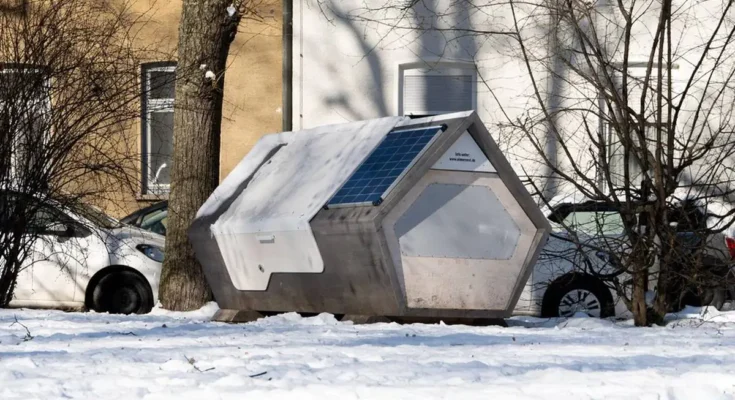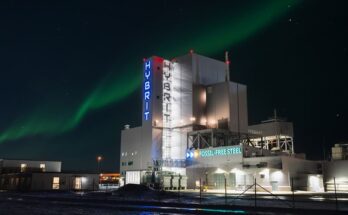In a compassionate response to homelessness, the city of Ulm in southern Germany has introduced an innovative solution to protect those without shelter from harsh winter conditions. Since late 2019, the municipality has been deploying specially designed sleeping capsules, known as Ulmer Nests, in public parks to offer a safe and warm refuge for individuals who might otherwise spend the night exposed to the elements.
These emergency shelters, created by a team of six young German product designers and app developers from Ulm, are not intended to replace traditional accommodation options. Instead, they serve as a last resort for those who, for various reasons, are reluctant or unable to use existing shelters or collective housing. The Ulmer Nests are particularly crucial during periods of extreme cold, providing a lifeline for some of society’s most vulnerable members.

The capsules are equipped with several features to ensure the safety and comfort of their occupants. Thermal insulation helps maintain a warmer interior temperature compared to the outside environment, while a smoke detector adds an extra layer of security.
The pods are fitted with an array of sensors that monitor temperature, humidity, smoke, and carbon dioxide levels, creating a comprehensive environmental control system. To enhance user safety, an electronic verification system allows occupants to lock the capsule from the inside, giving them control over their personal space.

Inside the Ulmer Nests, designers have included lighting for visibility and comfort, as well as an alarm signal buzzer for emergencies. A ventilation system ensures a steady supply of fresh air, maintaining a healthy atmosphere within the enclosed space. When someone enters a pod, a notification is automatically sent to volunteers from the Caritas Ulm-Alb-Donau association. The following morning, a volunteer visits the site to check on the occupant’s well-being and offer assistance if needed.
Importantly, the Ulmer Nests prioritize user privacy. There are no cameras installed inside the pods, reflecting a commitment to preserving the dignity and autonomy of those seeking shelter. Instead, motion sensors are triggered when the doors are opened, alerting social workers that the pod has been used.

Each pod’s technical components are connected to a central control unit that transmits data via LoRaWAN or GSM networks, allowing for real-time monitoring and quick response to any issues. This system allows for timely cleaning of the spaces and provides an opportunity for outreach workers to offer additional support to those who might need it, all while respecting individual privacy.
It’s important to note that these pods are not a permanent housing solution. They are deployed only during winter months, with currently two units available in Ulm, a city of over 100,000 residents. The project aims to supplement existing frostbite protection measures in the city, targeting those who might otherwise fall through the cracks of the social support system.

The development of the Ulmer Nest involved extensive planning and consultation with various stakeholders, including the fire department, police, community services, and medical personnel. The designers carefully considered material choices, opting for a combination of solid wood for the main structure and powder-coated sheet steel for areas requiring more rigorous cleaning. This blend of materials offers a balance of durability, insulation, and ease of maintenance.
The project goes beyond merely providing shelter. It serves as a unique opportunity to gather valuable data on the effectiveness of such emergency accommodations and their impact on urban communities. This information could prove instrumental in shaping future policies and initiatives related to homelessness and frostbite protection.

While the Ulmer Nest offers a novel approach to addressing homelessness during extreme weather, its creators emphasize that it should be viewed as an emergency measure of last resort. The capsules are not designed to withstand prolonged periods of severely low temperatures and cannot replace the comprehensive support provided by traditional shelters or housing programs.
As this pilot project unfolds, it has the potential to inspire similar initiatives in other cities facing comparable challenges. The Ulmer Nest represents a thoughtful attempt to bridge the gap in existing social services, offering a glimmer of hope and dignity to those who might otherwise be left out in the cold. By combining innovative design, technology, and social responsibility, Ulm is taking a step towards creating a more inclusive and caring urban environment for all its residents, regardless of their housing status.



